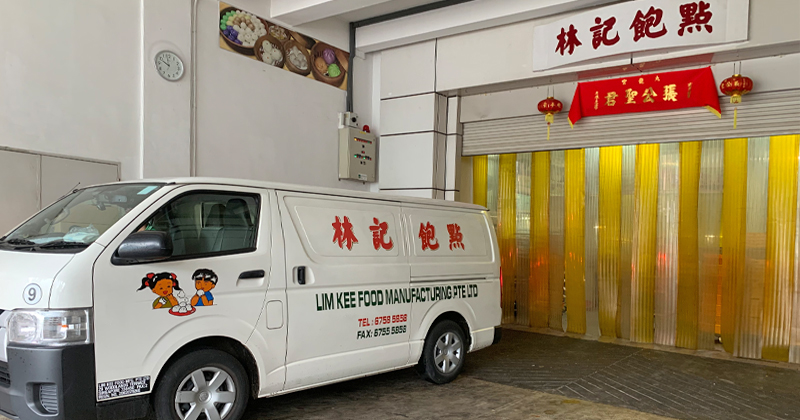
In food manufacturing, some chefs may rely on instinct and gut feel to whip up a dish, instead of following a specific recipe.
This was the case for Lim Kee, whose steamed buns and meat dumplings’ tastes differ based on each head chef’s signature style.
Noting that cooking can be “both an art and a science”, the home-grown food manufacturer and distributor decided to draw up a comprehensive manual comprising a standardised set of recipes for its kitchen crew.
The manual details preparation and cooking processes, right down to the specific measurement of each ingredient.
Explaining the decision for the move, Mr Ang Khim Wee, Head of Business Development, said, “We want to be able to transfer tacit knowledge among staffs within the company, and have a set of standardised benchmarks for everyone to follow so that delivery is consistent and reliable.”
Marching towards Industry 4.0
Faced with increasing labour and production costs, and a soaring demand for ready meals in recent years, Lim Kee had to “rethink a more sustainable way” to manage its business.
These “key driving forces” prompted it to embark on automation and redesign its processes.
With the support of the Enterprise Development Grant, Lim Kee installed an automated rotary sealing machine, with parts fabricated from Taiwan, Europe and the UK in January 2019. It now takes 2.5 hours to seal 4,000 to 6,000 of its top selling product – Loh Mai Gai (Chicken Glutinous Rice) on a daily basis. Previously, it took two workers 16 hours to manually seal the products. They also had to stand to do so.
Equipped with a digital interface, the machine can also automatically calculate Lim Kee’s daily production volume and stamp different shelf lives on individual products.
In fact, to prepare itself for the fourth industrial revolution, Lim Kee is taking steps to upgrade existing analogue machines into smart machines – by leveraging data analytics and intelligence systems to streamline operations.
Mr Ang said that these moves have helped Lim Kee reduce reliance on manpower and allow them to “better deploy existing workers” into higher value functions, such as assisting with the management of process flow, said Mr Ang.
Setting sights on expansion
Lim Kee has established a strong foothold in the local B2B market – supplying to more than 1,200 food services outlets (i.e. coffee shops, food courts, institutions and hawker centres) island wide. It also exports internationally to Australia, China, Hong Kong and Thailand.
It makes it a point to constantly reinvent its offerings to capture the overseas market – such as coming up with Singapore-themed products e.g. curry chicken pau to sell to the 7-Eleven outlets in Hong Kong.
Noticing that its consumers are getting more health conscious, Lim Kee also knew it had to find ways to appeal to this customer segment. Through Enterprise Singapore’s facilitation, it joined forces with local startup Alchemy Foodtech in August 2018, to incorporate low glycemic index (GI) ingredients into its buns.
Tapping food innovation
Alchemy Foodtech, as its name suggests, is a food tech startup that was set up in Singapore with the goal of fighting diabetes. Its two core products i.e. 5ibrePlus (a powder blend of natural plant fibres and extracts) and 5ibreGrain (which is 5ibrePlus shaped into grain form) can be added to food – especially highly-refined carbohydrate staples, to lower their GI without changing the colour, taste or texture.
Alchemy Foodtech’s CEO Mr Alan Phua said that Enterprise Singapore’s StartupSG Tech programme was pivotal in supporting its costly clinical studies, which was conducted at the University of Sydney in 2016 and 2017.
This was especially when the “risk of failure is very high” in deep tech for food innovation and research.
Bringing the best of both worlds together
For Mr Phua, the collaboration with a traditional large company such as Lim Kee has helped accelerate Alchemy Foodtech’s growth and build up its credibility. It is now looking to branch out to new markets such as China.
As for Mr Ang, he felt that the partnership combines the strengths of Lim Kee’s manufacturing know-how and Alchemy Foodtech’s research and development.
“We are able to focus on our own specialisation, and this has significantly shorten the amount of time needed to go-to-market.”
It also allows for a “greater value-add” to their products, especially with an uptrend of growing affluence and priorities towards healthy lifestyles.
2019 is the year of “building a resilient business model and being more productive” for Lim Kee. Mr Ang attributes the various changes so far in having created “double the profit margins” for the company.
“Everything comes together – from getting the system, processes, standards, training of people and quality of products right.”
Read all stories here.

